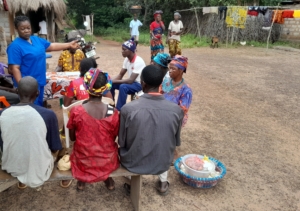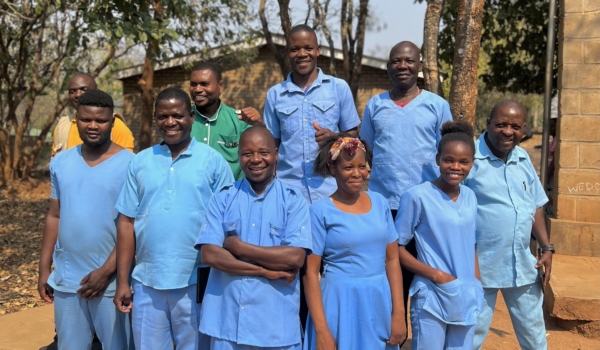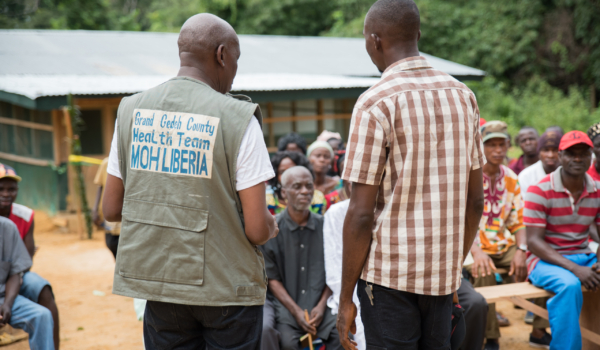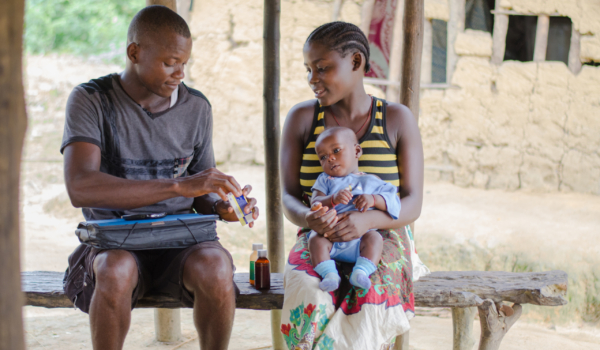In 2021, the Sierra Leone Ministry of Health made an exciting revision to their national community health worker policy to equip the workforce to deliver an integrated package of primary health services – a critical component of universal health coverage.
Alongside this change, the Ministry of Health launched a research initiative with Last Mile Health and Exemplars in Global Health to examine the recruitment, training, and implementation of policy. The research aimed to evaluate the success in real-time of their efforts to recruit and train over 8,000 community health workers and make data-driven decisions to drive improvements. Read a summary of the findings on Exemplars in Global Health’s website.

Community health workers and supervisors take part in on-site training using a new supervision tool in Kambia, Sierra Leone.
The research findings
The Ministry of Health partnered with Last Mile Health to launch a research initiative conducted between 2021-2024, supported by Exemplars in Global Health–a program that studies achievements and shares global health research to help decision makers and funders increase their impact. In its first phase, the research gathered recruitment and training data for a cohort of 8,000+ community health workers, with results disseminated nationally by August 2023. In its second phase, the research studied the implementation of the national program across five key performance domains: roles and responsibilities, supplies and equipment, supervision, incentives, and data. The methods included 1,680 phone surveys with a representative sample of community health workers from across all 16 districts in the country.
The evaluation captured important progress in the ongoing implementation strengthening of the national program, leading to key insights on where the program has made significant strides in translating policy to practice. Key milestones include:
- Revised and implemented recruitment guideline and training curriculum to align with the new integrated service package provided by community health workers
- Drafted key resources for the program, including a strategy, investment case, sustainability plan, and operational plan
- Digitized the community health information system
- Alongside the Ministry of Health, co-designed and implemented a digital community health worker supervision tool to align with the new service package
In addition to this steady progress, the evaluation also identified areas for improvement, which the Ministry of Health continues to prioritize to increase effectiveness and sustainability. For instance, data showed that while community health workers are dedicated to their roles, they often do not have the support they need to do their jobs effectively, impacting the range of services they are able to provide and report on. Other challenges include:
- Community health workers struggle to implement all their roles and responsibilities due to an expansive scope of work, multiple assigned communities, and delayed payment.
- Hard-to-reach community health workers in particular are not receiving the supplies they need to do their jobs, including basic medication to treat the leading causes of child mortality (malaria, pneumonia, diarrhea).
- Gender targets for the workforce are not being met, with only about one third of community health workers identifying as women. This limits the program’s effectiveness to deliver reproductive, maternal, and child health services to patients, who are predominantly women and their children.
- Finally, the current program may not meet the needs of patients or community health workers living in urban areas, as evidenced by urban and peri-urban districts being among the lowest-performing districts in the country.
These findings were reviewed and validated with diverse stakeholders in Sierra Leone, including community health workers, who helped to identify the root cause of the challenges and co-create recommendations on how to improve them moving forward. The recommendations are designed to increase fidelity to the national policy, improve community health worker performance, and better support community health workers to enable them to provide quality community-based care.
Why this matters for community health workers and patients
Ultimately, this work is meaningful because it simultaneously improves the working conditions of essential community health workers to better serve their patients, and strengthens the overall data ecosystem in the country. As one Sierra Leonean community health worker Amadu Kamara reflected, “Community health workers go to the farthest communities to save lives. They bring awareness to the communities about health and tell them how to prevent diseases. An effective community health worker can help improve health outcomes, improve the health of children and pregnant and nursing women, and reduce maternal death and death in under-five children.”








